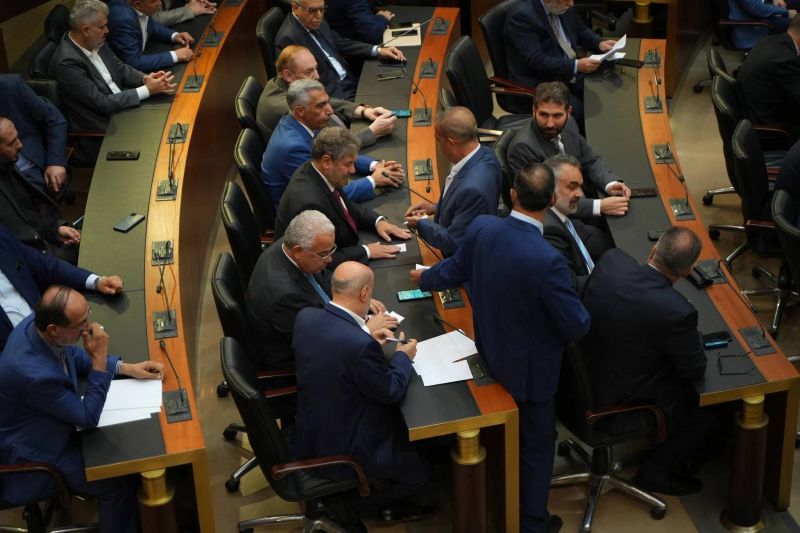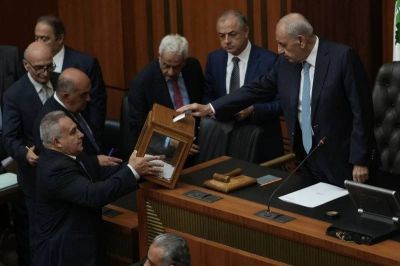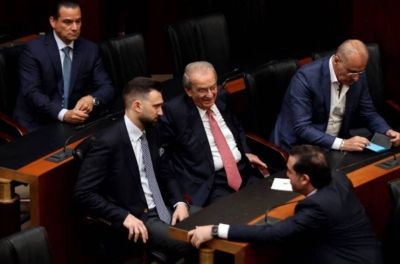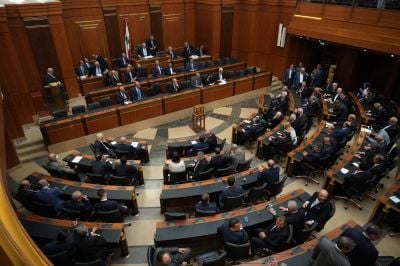
A view of Parliament. (Credit: Mohammad Yassin/L'Orient-Le Jour/File photo)
As with the previous electoral sessions, Parliament Speaker Nabih Berri closed the June 14 meeting after a first round of votes, in which 59 MPs cast ballots for IMF official and opposition-backed Jihad Azour and 51 for Marada Movement leader Sleiman Frangieh, the preferred candidate of Hezbollah and the Amal Movement.
The opposition camp was counting on 65 votes for Azour to take the election to the second round of voting.
So, what caused the less-than-ideal outcome? A relentless lobbying effort by both Hezbollah and Amal, primarily targeting “undecided” MPs, as well as independent deputies who were, previously, regarded as influential opposition figures during last year’s parliamentary elections.
These MPs, who have moderated their positions since assuming office, are contributing to the expanding “grey area” within Parliament.
More fence-sitters
One opposition political figure, who spoke on condition of anonymity, said that Azour enjoyed support from both the opposition and the Free Patriotic Movement (FPM), which theoretically should have secured him a vote count well above 65.
However, his result saw setbacks in three stages.
Firstly, approximately 10 Sunni MPs refrained from getting involved in the power struggle between the Shiites and the Christians, resulting in their withdrawal of support.
Secondly, six votes were lost to former Interior Minister Ziyad Baroud, primarily from left-wing MPs critical of Azour’s previous transition to the Finance Ministry.
The third complicating factor arose from independent MPs who initially positioned themselves as staunch opponents of Hezbollah and its weapons during the legislative elections but later moderated their rhetoric once they assumed their seats.
This is the case of several MPs, notably Tripoli MP Ihab Matar and Neemat Frem, MP for Jbeil-Kesrouan.
Frem campaigned as a symbol of opposition and “change,” positioning himself as the “useful vote” in Kesrouan, known as an FPM stronghold.
In a surprising turn of events, Frem managed to secure the election of his close associate, Jamil Abboud, as a candidate in Tripoli on the Ashraf Rifi list, known for its strong anti-Hezbollah stance.
However, much to everyone’s surprise, during the parliamentary consultations in June 2022 to appoint a prime minister, Frem split the votes of his bloc. One vote was cast blank, while the other went to Najib Mikati, the favorite candidate of Hezbollah and Amal.
Since then, Frem has been coordinating his positions with the ex-Haririans of the National Moderation, widely recognized as the quintessential neutral bloc.
“Frem did it again on Wednesday. He may have voted for Azour as he promised the Maronite Patriarch, but he asked Jamil Abboud to vote for Frangieh,” an MP told L’Orient-Le Jour on condition of anonymity.
When contacted for confirmation, Abboud declined to disclose his voting choice during the election session.
In a similar vein, Michel Daher, elected in Zahle under the banner of “sovereignism,” surprised many by voting for Elias Bou Saab, who was Hezbollah’s candidate for the position of deputy parliament speaker. Although Daher had previously asserted that his vote was not a “political position in favor of March 8,” he exhibited a prolonged hesitation in supporting Azour during last week’s session before reportedly changing his mind at the last moment, or so he claims. Since the conclusion of the meeting, he has been advocating for a compromise by endorsing a third-party candidate as the way forward.
Several MPs also indicated that Jean Talouzian, MP for Beirut I, who was allied with the Kataeb in the 2022 elections, also voted Frangieh. L’Orient-Le Jour was not able to contact Talouzian for comment.
Pragmatism or self-interest?
The question arises as to how these changes of heart can be explained.
“There has been no U-turn,” a close associate of Frem said on condition of anonymity. “It’s just a pragmatic position.”
The source added: “Frem was in opposition during the last [presidential] mandate. But today, in a country where the state is disintegrating without a president or a government in office, there is no possible opposition. We need to rebuild first and initiate an economic rescue. Contentious issues, on the other hand, must be calmly debated.”
This interpretation, which prioritizes resolving the socio-economic crisis over questions of weapons and political alignments, is widely shared among the majority of undecided MPs.
“Hezbollah has successfully avoided the issue of its weapons in the current political debate,” said political scientist Karim Mufti. “The unaffiliated MPs, lacking substantial political cover, are not inclined to tread that path.”
Such “pragmatic” arguments, however, are not convincing for the opposition parties.
“To rebuild our institutions, we require a true alliance from the entire reform camp against the militia that is effectively holding the state hostage,” said the aforementioned opposition figure. The source maintains that if such an alliance had been formed at the outset, “we would not be facing the dire situation we find ourselves in today.”
“Whether it is disguised as realism, driven by ideology, or motivated by personal interest, simply standing aside does not benefit anyone,” the source added.
But pragmatism alone cannot fully account for the apparent “moderation” in the rhetoric of these independent MPs.
"Traditionally, MPs have been influenced by various factors, particularly when it comes to official votes,” Mufti explained. “Even the major parties sometimes find it difficult to control the votes of their MPs. Given this context, one can imagine the maneuverability that these independents, who claim to be in opposition but align themselves strategically, possess.”
That is why some MPs have opted for appeasement with Hezbollah, primarily driven by their own interests. This inclination is reinforced by the fact that Hezbollah holds considerable influence within the Lebanese political landscape and can bestow rewards to its allies.
Notably, Frem himself harbors presidential ambitions. According to his close associate, “He is willing to engage in discussions with all parties, including Hezbollah and Amal, in order to garner support from as many MPs as possible and initiate the process of rebuilding the country.”
It appears that with this approach Frem wants to set himself apart from his colleague Michel Moawad, the previous opposition-endorsed candidate and a staunch critic of Hezbollah, who had to withdraw his candidacy due to the intransigency of Amal and Hezbollah. Frem reportedly had discussions with Berri in early June regarding his candidacy, while also increasing his number of economic-related meetings.
This article was originally published in French in L'Orient-Le Jour. Translation by Sahar Ghoussoub.


